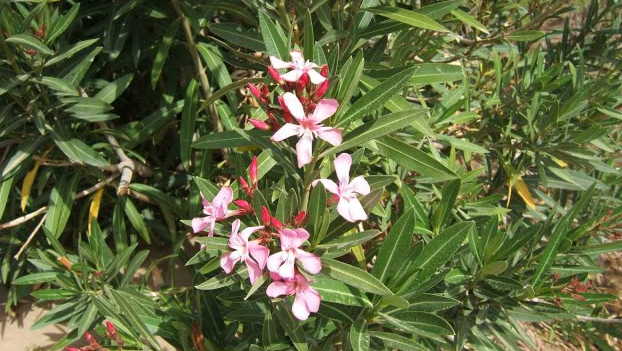Kerala Temples Ban Oleander After Woman’s Death (GS Paper 2, Governance)

Why in News?
- In response to the tragic death of a 24-year-old woman, Surya Surendran, who accidentally consumed oleander leaves, two major religious temple boards in Kerala have taken action to prevent future incidents by imposing a ban on the use of oleander flowers in temple offerings.
Incident and Immediate Action
- The victim inadvertently chewed oleander leaves, resulting in severe poisoning and her subsequent demise.
- Prompt action by the Travancore Devaswom Board and the Malabar Devaswom Board aims to mitigate risks by restricting the flower’s use in religious offerings and prasad, ensuring the safety of devotees.
Understanding Oleander and Its Risks
- Nerium oleander, widely cultivated for its ornamental value, harbors potent cardiac glycosides in all its parts, including leaves, stems, flowers, and roots, posing a significant health hazard.
- Symptoms of oleander toxicity range from gastrointestinal distress to irregular heart rate and can even prove fatal in severe cases.
Dual Nature of Oleander in Traditional Medicine
- While parts of the oleander plant have historically been utilized in Ayurvedic remedies for treating skin conditions and other ailments, medical experts caution against its unchecked usage due to its narrow therapeutic window and high toxicity.
Safety Measures and Medical Intervention
- Immediate measures following oleander ingestion are crucial, including rinsing the mouth and consuming fluids to aid detoxification.
- Hospital admission is often necessary to manage symptoms, with timely medical intervention crucial for recovery.
About Ayurvedic Pharmacopoeia of India
- The Ayurvedic Pharmacopoeia of India (API), a governmental document, sets standards for Ayurvedic drugs and substances, ensuring their quality, purity, and efficacy.
- It provides guidelines for practitioners, researchers, and manufacturers, crucial for standardizing Ayurvedic practices and product manufacturing.
Conclusion
- The recent ban on oleander in temple offerings underscores the importance of public awareness and regulatory responses to mitigate the risks associated with toxic plants, emphasizing the paramountcy of safety in religious practices.


